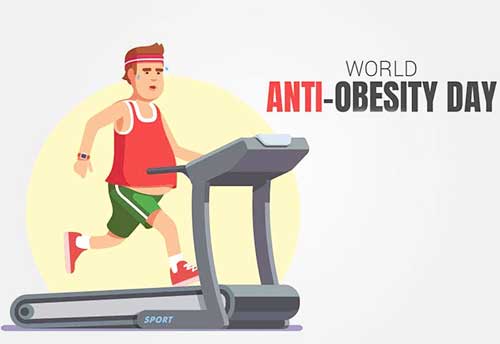
Every year, Anti-Obesity Day serves as a vital reminder to address one of the most pressing health challenges of our time—obesity. This day emphasizes raising awareness about obesity, promoting healthier lifestyles, and advocating for practical solutions to curb this growing epidemic. With obesity rates climbing globally, Anti-Obesity Day provides a platform for governments, healthcare providers, and individuals to work together in creating sustainable changes for a healthier future.
Understanding Anti-Obesity Day
Anti-Obesity Day, observed annually on November 26, is dedicated to raising awareness about the dangers of obesity and the importance of maintaining a healthy lifestyle. Established by health organizations, this day aims to educate people about the medical, emotional, and social consequences of obesity and encourage them to adopt better habits to improve their overall well-being.
The significance of this day extends beyond individual health—it also addresses public health concerns, including rising healthcare costs, the burden on medical systems, and the global economic impact of obesity-related diseases.
The Global Rise of Obesity
Obesity is no longer a problem confined to specific regions or populations. It has become a global pandemic affecting all age groups, from children to adults. According to the World Health Organization (WHO), the number of obese individuals worldwide has tripled since 1975.
Factors Contributing to Obesity
• Poor Dietary Habits: The rise in consumption of processed foods, sugary drinks, and fast food is a significant contributor to obesity.
• Sedentary Lifestyles: Increased reliance on technology and decreased physical activity have significantly impacted global obesity rates.
• Genetic Predisposition: While lifestyle choices play a crucial role, genetics also influence a person's likelihood of becoming obese.
• Environmental Factors: Urbanization and limited access to nutritious foods in some areas exacerbate the issue.
Health Risks Associated with Obesity
Obesity is more than just a cosmetic concern. It is a leading risk factor for numerous chronic health conditions, including:
• Cardiovascular Diseases: Obesity increases the risk of heart attacks, strokes, and high blood pressure.
• Diabetes: Type 2 diabetes is strongly linked to obesity, as excess weight can lead to insulin resistance.
• Joint Problems: Extra weight puts additional strain on joints, often resulting in arthritis and mobility issues.
• Mental Health Issues: Obesity can negatively impact self-esteem and is associated with depression and anxiety.
The Role of Anti-Obesity Day in Awareness and Action
Anti-Obesity Day seeks to address these challenges by encouraging individuals and communities to adopt proactive measures against obesity. Its initiatives include:
• Educational Campaigns: Spreading information about balanced diets, regular exercise, and the dangers of obesity.
• Public Health Programs: Governments and organizations conduct free health screenings, workshops, and fitness events.
• Policy Advocacy: Anti-Obesity Day serves as a platform to push for regulations like sugar taxes and improved food labeling to help consumers make healthier choices.
Tips for a Healthier Lifestyle
Maintaining a healthy weight requires commitment, but small, consistent changes can make a significant difference. Here are actionable steps to combat obesity:
Adopt a Balanced Diet
Focus on a diet rich in whole foods, including fruits, vegetables, lean proteins, and whole grains. Avoid processed and sugary foods that are high in empty calories. Portion control is also critical—overeating, even healthy foods, can contribute to weight gain.
Regular Physical Activity
Exercise is essential for burning calories and maintaining overall health. Aim for at least 150 minutes of moderate-intensity exercise per week, such as brisk walking, swimming, or cycling. Strength training twice a week can also help build muscle and boost metabolism.
Monitor Your Progress
Keeping track of your weight, food intake, and physical activity can help you stay on track. Mobile apps and fitness trackers can make monitoring more accessible and more engaging.
Seek Professional Guidance
For individuals struggling with obesity, consulting a healthcare provider or registered dietitian can provide personalized recommendations tailored to their needs. In some cases, medical interventions, such as weight-loss medications or surgery, may be necessary.
How Communities Can Support Anti-Obesity Efforts
Addressing obesity requires a collaborative approach. Communities play a vital role in creating environments that support healthy living:
• Encouraging Physical Activity: Building parks, bike lanes, and recreational spaces promotes regular exercise.
• Improving Access to Nutritious Foods: Local governments can partner with farmers' markets and grocery stores to make healthy food options affordable and accessible.
• Organizing Awareness Events: Schools, workplaces, and community centers can host events to educate people about obesity and healthy habits.
Obesity in Children: A Growing Concern
Childhood obesity is a particularly alarming trend. Overweight children are more likely to become obese adults and face long-term health complications. Factors contributing to childhood obesity include poor dietary habits, lack of physical activity, and excessive screen time.
Parents and schools play a pivotal role in preventing childhood obesity. Encouraging active play, teaching nutrition, and limiting junk food consumption are vital steps in fostering healthier lifestyles among children.
Anti-Obesity Day and the Broader Health Context
Anti-Obesity Day is interconnected with other global health observances, such as "International Day for the Elimination of Violence against Women A Comprehensive Guide," to highlight societal issues and promote wellness. This synergy emphasizes the importance of addressing health challenges holistically, recognizing how physical, mental, and social well-being are interrelated.
Innovations in Obesity Management
Medical science continues to evolve, offering innovative approaches to obesity management. These include:
• Advanced Weight-Loss Programs: Tailored programs incorporating nutrition, exercise, and psychological support.
• Medications: New drugs have emerged to help regulate appetite and promote weight loss safely.
• Bariatric Surgery: Surgical interventions, such as gastric bypass, offer solutions for individuals with severe obesity.
Why Anti-Obesity Day Matters
This observance is more than a date on the calendar—it is a call to action. By highlighting the consequences of obesity and promoting solutions, Anti-Obesity Day empowers individuals and communities to take charge of their health.
Combatting obesity requires effort at all levels—individual, familial, and societal. A healthier, more active population is achievable through education, policy change, and innovation.
Conclusion
Anti-Obesity Day is a crucial reminder of the urgent need to address obesity and its consequences. This global health crisis demands awareness, collaboration, and action from all sectors of society. By embracing healthier lifestyles and fostering supportive environments, we can work toward a future where obesity no longer poses a significant threat to public health. Let Anti-Obesity Day inspire us to take the first step toward better health—for ourselves, our families, and future generations.





